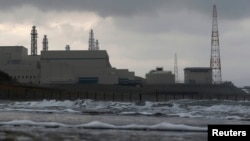The operator of Japan's crippled Fukushima nuclear plant is seeking to restart a separate nuclear power facility.
The Tokyo Electric Power Company, or TEPCO, applied to Japan's nuclear regulator for permission to restart two reactors at the Kashiwazaki Kariwa plant, located about 300 kilometers northwest of Tokyo.
The plant would need to pass safety inspections by the Nuclear Regulation Authority in order for the reactors to be restarted. A decision is not expected for months. It will also need to receive local government approval.
Prime Minister Shinzo Abe and his conservative government are seeking a gradual restart of Japan's 50 nuclear reactors after they were shut down in the aftermath of the 2011 nuclear crisis at the Fukushima-Daiichi nuclear power plant.
Popular opinion has swung sharply against nuclear power following the earthquake-sparked disaster, which knocked out cooling systems and caused meltdowns at the Fukushima plant.
Two and a half years after the crisis began, radioactive material continues to leak into the surrounding air and water. The failure to contain the leaks has prompted the Japanese government to take a bigger role in the cleanup process.
The government hopes that a restart of the energy-starved country's nuclear reactors will help reduce its reliance on costly imported fuel, which has contributed to recent record trade deficits.
The Tokyo Electric Power Company, or TEPCO, applied to Japan's nuclear regulator for permission to restart two reactors at the Kashiwazaki Kariwa plant, located about 300 kilometers northwest of Tokyo.
The plant would need to pass safety inspections by the Nuclear Regulation Authority in order for the reactors to be restarted. A decision is not expected for months. It will also need to receive local government approval.
Prime Minister Shinzo Abe and his conservative government are seeking a gradual restart of Japan's 50 nuclear reactors after they were shut down in the aftermath of the 2011 nuclear crisis at the Fukushima-Daiichi nuclear power plant.
Popular opinion has swung sharply against nuclear power following the earthquake-sparked disaster, which knocked out cooling systems and caused meltdowns at the Fukushima plant.
Two and a half years after the crisis began, radioactive material continues to leak into the surrounding air and water. The failure to contain the leaks has prompted the Japanese government to take a bigger role in the cleanup process.
The government hopes that a restart of the energy-starved country's nuclear reactors will help reduce its reliance on costly imported fuel, which has contributed to recent record trade deficits.





